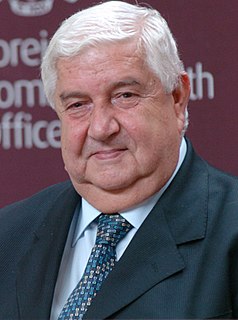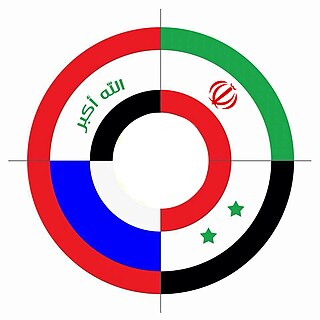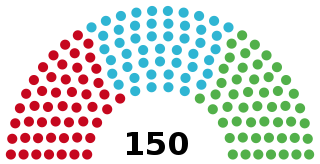
Ensuring national security, increasing influence among its Arab neighbours and securing the return of the Golan Heights, have been the primary goals of the Syrian Arab Republic's foreign policy. At many points in its history, Syria has seen tension with its neighbours, such as Turkey, Israel, Jordan, Iraq, and Lebanon. Syria enjoyed an improvement in relations with several of the states in its region in the 21st century, prior to the Arab Spring and the Syrian Civil War.

Bashar Hafez al-Assad is a Syrian politician who is the 19th president of Syria, since 17 July 2000. In addition, he is the commander-in-chief of the Syrian Armed Forces and the Secretary-General of the Central Command of the Arab Socialist Ba'ath Party.

Adel Al-Jubeir is a Saudi diplomat who is the former Saudi Minister of Foreign Affairs and the current Saudi Minister of State for Foreign Affairs. He is the second person not belonging to the House of Saud to hold the office, after Ibrahim bin Abdullah Al Suwaiyel. He previously served as the Saudi Ambassador to the United States from 2007 to 2015, and was also a foreign policy advisor to King Abdullah.

Walid Mohi Edine al Muallem was a Syrian diplomat and Ba'ath Party member who served as foreign minister from 2006 to 2020 and as deputy prime minister from 2012 to 2020.

Russia–Saudi Arabia relations is the bilateral relationship between Russian Federation and Kingdom of Saudi Arabia. The two countries are referred to as the two petroleum superpowers and account for about a quarter of the world's crude oil production between them.

UAE–Syria relations refer to the relationship between the United Arab Emirates and the Syrian Arab Republic. The United Arab Emirates has an embassy in Damascus, and Syria has an embassy in Abu Dhabi and a consulate-general in Dubai. Both countries are members of the Arab League, part of the Middle East region and share close cultural ties.

The Syrian civil war is an ongoing multi-sided civil war in Syria fought between the Syrian Arab Republic led by Syrian president Bashar al-Assad and various domestic and foreign forces that oppose both the Syrian government and each other, in varying combinations.
International reactions to the Syrian Civil War ranged from support for the government to calls for the government to dissolve. The Arab league, United Nations and Western governments in 2011 quickly condemned the Syrian government's response to the protests which later evolved into the Syrian Civil War as overly heavy-handed and violent. Many Middle Eastern governments initially expressed support for the government and its "security measures", but as the death toll mounted, especially in Hama, they switched to a more balanced approach, criticizing violence from both government and protesters. Russia and China vetoed two attempts at United Nations Security Council sanctions against the Syrian government.

The Syrian peace process is the ensemble of initiatives and plans to resolve the Syrian civil war, which has been ongoing in Syria since 2011 and has spilled beyond its borders. The peace process has been moderated by the Arab League, the UN Special Envoy on Syria, Russia and Western powers. The negotiating parties to end the conflict are typically representatives of the Syrian Ba'athist government and Syrian opposition, while the Autonomous Administration of North and East Syria is usually excluded at the insistence of Turkey. Radical Salafist forces and the Islamic State of Iraq and the Levant have not engaged in any contacts on peaceful resolution to the conflict.

Russia has supported the administration of incumbent President Bashar al-Assad of Syria since the beginning of the Syrian conflict in 2011: politically, with military aid, and through its Mission in Syria with direct military involvement. The 2015 deployment to Syria marked the first time since the end of the Cold War in 1991 that Russia entered an armed conflict outside the borders of the former Soviet Union.

Foreign involvement in the Syrian Civil War refers to political, military and operational support to parties involved in the ongoing conflict in Syria that began in March 2011, as well as active foreign involvement. Most parties involved in the war in Syria receive various types of support from foreign countries and entities based outside Syria. The ongoing conflict in Syria is widely described as a series of overlapping proxy wars between the regional and world powers, primarily between the US and Russia as well as between Iran and Saudi Arabia.

The U.S.–Russia peace proposals on Syria refers to several American–Russian initiatives, including joint United States–Russia proposal issued in May 2013 to organize a conference for obtaining a political solution to the Syrian Civil War. The conference was eventually mediated by Lakhdar Brahimi, the United Nations peace envoy for Syria.

The Geneva II Conference on Syria was a United Nations-backed international peace conference on the future of Syria with the aim of ending the Syrian Civil War, by bringing together the Syrian government and the Syrian opposition to discuss the clear steps towards a transitional government for Syria with full executive powers. The conference took place on 22 January 2014 in Montreux, on 23–31 January 2014 in Geneva (Switzerland), and again on 10–15 February 2014.

Saudi Arabia–Syria relations refer to diplomatic and economic relations between Saudi Arabia and Syria. Diplomatic ties between these two countries of the Middle East have long been strained by the major events in the region. Relations between Saudi Arabia and Syria deteriorated further following the Syrian Civil War and Saudi Arabia's numerous calls for Bashar Assad to be removed from power. Saudi Arabia cut off relations with Syria after they decided to close its embassy in Damascus and expel the Syrian ambassador in 2012.

The Islamic Republic of Iran and the Syrian Arab Republic are close strategic allies, and Iran has provided significant support for the Syrian government in the Syrian civil war, including logistical, technical and financial support, as well as training and some combat troops. Iran sees the survival of the Syrian government as being crucial to its regional interests. When the uprising developed into the Syrian Civil War, there were increasing reports of Iranian military support, and of Iranian training of the National Defence Forces both in Syria and Iran.

The Russia–Syria–Iran–Iraq coalition, also referred to as 4+1, is a joint intelligence-sharing cooperation between opponents of the Islamic State (IS) with operation rooms in Syria's Damascus and Iraq's Green Zone in Baghdad. It was formed as a consequence of an agreement reached at the end of September 2015 between Russia, the Islamic Republic of Iran, Iraq and the Syrian Arab Republic to "help and cooperate in collecting information about the terrorist Daesh group" (ISIL) with a view to combatting the advances of the group, according to the statement issued by the Iraqi Joint Operations Command. The statement also cited "the increasing concern from Russia about thousands of Russian terrorists committing criminal acts within ISIS."

The Geneva peace talks on Syria, also known as Geneva III, were intended peace negotiations between the Syrian government and opposition in Geneva under the auspices of the UN. Although formally started on 1 February 2016, they were formally suspended only two days later, on 3 February 2016.

Several attempts have been made to broker ceasefires in the Syrian Civil War.

The Syrian Constitutional Committee is a United Nations-facilitated constituent assembly process that seeks to reconcile the Syrian Government headed by President Bashar al-Assad and the Syrian opposition, in the context of the Syrian peace process, by amending the current or adopting a new Constitution of Syria. The UN hopes that this would lead to negotiations which would subsequently lead to a peaceful end of the Syrian Civil War, which had been raging for more than eight years by the time of the committee's formation. The Constitutional Committee was formed with the formal approval of both parties involved—namely the Government of the Syrian Arab Republic and the opposition Syrian Negotiations Commission, with the facilitation of the United Nations.
















